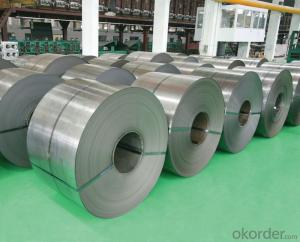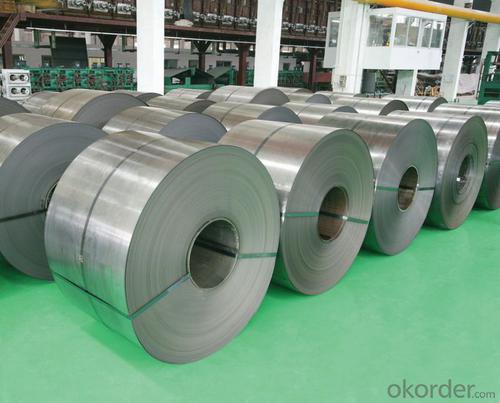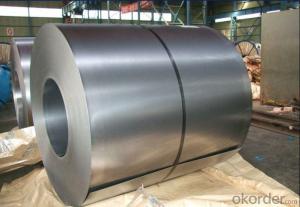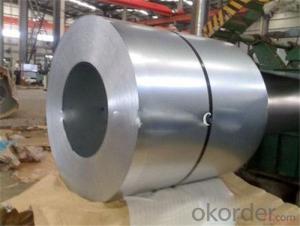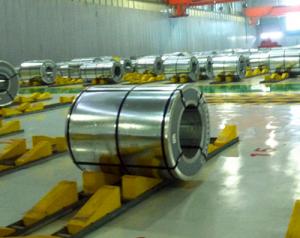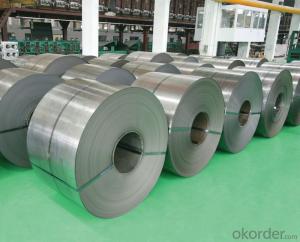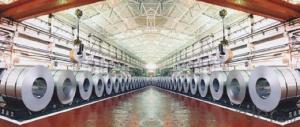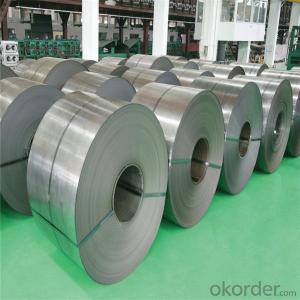THE COLD ROLLED STEEL COILS
- Loading Port:
- China Main Port
- Payment Terms:
- TT OR LC
- Min Order Qty:
- -
- Supply Capability:
- -
OKorder Service Pledge
OKorder Financial Service
You Might Also Like
Cold rolled steel is the based material forgalvanized steel coil and pre-painted galvanized steel coil. It is widely usedin light industry for marking tank, furniture, refrigerators, washers, freezerplate, air conditioner, micro-wave oven, water heater, soot such machine etc.
Main specification:
COLD ROLLED STEEL | |
Thicknenss | 0.10mm-4.00mm |
Width | 600mm-2000mm |
Sheets length | 1200-6000mm |
Coil inner diameter | 508-610mm |
Surface treatement | matt finish/bright finish,oiling/dry, bright anneal/black anneal |
Coil weight | 3-5t |
We can supply customers' with different specifications of the highest quality and lowest price.
Sincerely welcome to contact us for the future details if any item interest you ,and we will make every effort to assure that your requirements will be satisfied ,and we hope to establish long-term business relations with you on the basis of the equality and mutual benefit.
we are waiting for your email.
- Q: How are steel coils used in the production of oil and gas equipment?
- Steel coils are used in the production of oil and gas equipment as they are shaped and formed into various components such as pipes, tubes, and fittings. These coils provide the necessary strength, durability, and corrosion resistance required for the harsh operating conditions in the oil and gas industry. Additionally, steel coils are often used in the fabrication of storage tanks, pressure vessels, and offshore platforms, ensuring the safe and efficient extraction, processing, and transportation of oil and gas resources.
- Q: What is the shelf life of a steel coil?
- The duration for which a steel coil remains usable depends on several factors, including the type of steel, storage conditions, and protective measures implemented. Steel coils can generally be stored for a few months to several years. If a steel coil is stored appropriately in a controlled environment with suitable temperature, humidity, and ventilation, its lifespan can be extended. Moreover, if the coil is coated with protective substances like oil or anti-corrosion coatings, its shelf life can be further prolonged. However, if a steel coil is exposed to unfavorable storage conditions such as high humidity, extreme temperatures, or corrosive substances, its shelf life can significantly decrease. Rust and corrosion can occur due to exposure to moisture and oxygen, leading to a decline in quality and structural integrity. To maximize the shelf life of a steel coil, it is crucial to store it in a well-ventilated, dry area, away from direct sunlight and corrosive substances. Regular inspections and maintenance, including cleaning and reapplication of protective coatings, can also help preserve the coil's quality. Ultimately, it is essential to consult the manufacturer or supplier of the steel coil for specific recommendations regarding shelf life, as different types of steel may have varying levels of durability and specific storage requirements.
- Q: What is the standard length of steel coils?
- The standard length of steel coils can vary depending on the specific industry and application. However, common standard lengths range from 1000 to 6000 millimeters or 3 to 20 feet.
- Q: Is steel case ammo going to mess the gun up or is it just going to wear the parts out faster and if so how much faster? (I am not planning on reloading the rounds)
- First it is almost impossible to reload steel case ammo. It has Berdan primers, which are twice as hard to find re-prime with than regular 'Boxer' type primers. Steel case ammo, which is almost always laquer coated, will not be any more of a wear factor than brass cases, just don't leave a laquered round in a hot chamber, as the laquer will melt cause a jam when the round sticks in the chamber. Even with the price of components on the rise, I'd look into stocking up now! My reloads, including 7,62x39R's, are FAR superior to the surplus on the market, especially the steel-case, which I wouldn't shoot, myself. Once you have the brass cases, reloads are far cheaper than any surplus, to boot.
- Q: I need to know how you rate the hardness of steel any ideas?
- Find your portable hardness testers from our latest collections thats for sure having the ability to test hardness of metal alloys and plastic by applying some amount of pressure on it. All our evaluators can evaluate in Brinell, Rockwell and Vickers machines.
- Q: How are steel coils shipped internationally?
- Steel coils are typically shipped internationally using cargo ships or freight trains. The coils are securely loaded onto flatbed or container vessels, ensuring they are properly secured to prevent any damage during transportation. This method allows for efficient and cost-effective transportation of large quantities of steel coils across the globe.
- Q: How are steel coils used in the production of steel connectors?
- Steel coils are used in the production of steel connectors as they are formed into specific shapes and sizes, such as plates or bars, which are then cut, bent, and welded to create the connectors. The coils provide a continuous and easily manageable supply of steel material, allowing for efficient and precise manufacturing processes.
- Q: I believe steel is stronger but it steel lighter than iron too?
- Steel is iron, with other things added that strengthen it and/or make it less rust liable. So, in general, steel is stronger than iron. In so far as the density, that depends on the steel alloy. Some are higher than iron, some lower. Remember there are hundreds of different steel alloys. edit: but the density is still close to that of iron. density steel 7750 to 8050 kg/m? density iron 7870 kg/m?
- Q: What exactly is surgical stainless steel made of (metals)? Does it contain nickel? If so, what % does it usually contain? I am deciding between surgical stainless steel piercings or titanium. Both same price and looks. I want to know which one is more hypo-allergenic and generally nickel free.
- surgical stainless steel is an austenitic steel containing 18-20% chromium and 8-10% nickel. and some proportion of molybdenum. The word 'surgical' refers to the fact that these types of steel are well-suited for making surgical instruments: they are easy to clean and sterilize, strong, and corrosion-resistant. The nickel/chrome/molybdenum alloys are also used for orthopaedic implants as aids in bone repair, and as a structural part of artificial heart valves and other implants. However, immune system reaction to nickel is a potential complication. In some cases today titanium is used instead in procedures that require a metal implant which will be permanent. Titanium is a reactive metal, the surface of which quickly oxidizes on exposure to air, creating a microstructured stable oxide surface. This provides a surface into which bone can grow and adhere in orthopaedic implants but which is incorrodible after implant. Thus steel may be used for temporary implants and the more expensive titanium for permanent ones
- Q: What are the factors that affect the quality of steel coils?
- There are several factors that can affect the quality of steel coils. Firstly, the composition of the steel itself plays a crucial role in determining its quality. The presence of impurities, such as sulfur or phosphorus, can adversely affect the strength, durability, and overall performance of the steel. Additionally, the carbon content, alloying elements, and heat treatment of the steel also contribute to its quality. Secondly, the manufacturing process and techniques used during the production of the steel coils can significantly impact their quality. Factors such as the cleanliness of the production environment, the precision of the rolling and cooling processes, and the control of temperature and pressure during manufacturing can all influence the final quality of the coils. Furthermore, the surface quality of the steel coils is also a crucial factor. Any defects or imperfections on the surface, such as scratches, dents, or corrosion, can compromise the integrity and functionality of the coils. Proper handling, storage, and transportation of the coils are essential to maintaining their surface quality. Moreover, the mechanical properties of the steel coils, including tensile strength, yield strength, and elongation, are essential indicators of their quality. These properties depend on various factors, such as the type of steel, its thickness, and the processing conditions. Lastly, external factors such as environmental conditions, such as humidity and temperature, can affect the quality of steel coils. Exposure to moisture or extreme temperatures can lead to corrosion or other forms of degradation, impacting the overall quality and longevity of the coils. In conclusion, the quality of steel coils is influenced by several factors, including the composition of the steel, the manufacturing process, surface quality, mechanical properties, and external environmental conditions. It is crucial to ensure that these factors are carefully controlled and monitored to produce high-quality steel coils that meet the desired specifications and standards.
Send your message to us
THE COLD ROLLED STEEL COILS
- Loading Port:
- China Main Port
- Payment Terms:
- TT OR LC
- Min Order Qty:
- -
- Supply Capability:
- -
OKorder Service Pledge
OKorder Financial Service
Similar products
Hot products
Hot Searches
Related keywords
